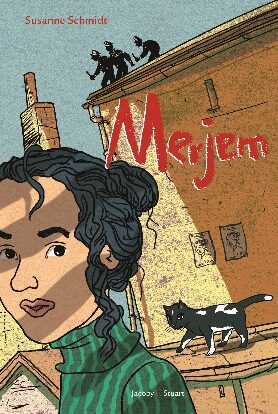Susanne Schmidt
Merjem
[Merjem]
- Jacoby & Stuart Verlag
- Berlin 2016
- ISBN 978-3-946593-05-8
- 208 Pages
- 9 Suitable for age 10 and above
- Publisher’s contact details
Susanne Schmidt
Merjem
[Merjem]
Sample translations
A girl goes into hiding
What a terrifying thought! Suddenly one night, in the still, small hours just before dawn, you hear loud hammering on your front door. Startled and still half asleep you open the door. Two policeman burst past you into the house and inform you that you have just twenty minutes to scrabble together your most essential possessions. They then start searching through the rooms. The family have been living in Germany for years as asylum seekers - without official authorisation, but hitherto without challenge. They have integrated into the community, they have acquired friends, they have jobs and they have bread on their table, their children enjoy school and have plenty of pals. They came to the country from Albania because they had received death threats in their home town of Tropoja. Now they are suddenly being expelled and no longer have the slightest chance of avoiding deportation.
This shocking scenario is the departure point for Susanne Schmidt’s extraordinary children’s novel, Merjem. Set in an unnamed German town, the novel is chiefly extraordinary for the fact that it uses the customary modes and stylistic techniques of children’s literature to depict the appalling way in which deportation procedures are carried out on a more or less daily basis, without the least regard for human dignity.
Susanne Schmidt’s novel begins with the fact that Merjem, the family’s 11-year-old daughter, has escaped deportation by hiding herself away in their house, and is now, in early November, holed up in the tennis court changing rooms at her school - without hope, without any plan of action, without any clothes beyond the bare minimum. From this point onwards the author gives vivid life to the underlying tragedy by coupling it with an exciting tale that is part family saga, part school story, part thriller.
What initially takes us by surprise soon proves to be an excellent means of drawing young readers into the story. And lo and behold: we soon feel warmly disposed towards Linus - the complete antithesis of the ‘Perfect Pupil’ - and smart little Dana, with whom Linus (as befits a boy of his age) is head over heels in love. Linus and Dana are classmates of Merjem’s, and once they have happened on the missing fugitive in the changing rooms, they do all they can to protect her. Linus lives with his single mother, Dana with her single father. In addition to the three central characters there are of course a few other school-mates playing their part in the background: equally unappealing at first sight, they too have hidden reserves of kindness and helpfulness that only become apparent as the story unfolds.
Taking as her core theme the tragic tale of a refugee child that appears at first to offer no chance of a happy outcome, the author successfully combines it with a variety of other strands: the completely normal everyday life of young people in a completely normal school; the complications and confusions so common in broken families; the challenges that the smartphone generation are exposed to in their spare-time world. Even the book’s detective story element - the racist caretaker’s involvement in the trading of counterfeit big-brand trainers - is seamlessly integrated into the story of Merjem and her miserable life in hiding.
It gives grounds for real hope that the warm-hearted and fervent, if totally naive efforts by Linus and Dana to improve Merjem’s situation generate a sort of communal campaign of action in which a group of individuals, highly disparate but all driven by good will, demonstrate with both courage and wit what they are truly capable of.
Translated by John Reddick

By Siggi Seuß
Siggi Seuß, freelance journalist, radio script writer and translator, has been writing reviews of books for children and young people for many years.
Publisher's Summary
Legal - illegal
Merjem is a tale about asylum and deportation. At once a thriller and a story about friendship, it is both exciting and warm-hearted, and with its realism and its humour it offers an encouraging example of both solidarity and effective problem-solving.
When 12-year-old Linus is ordered by the school caretaker to paint over the graffiti he had daubed on a wall, he happens on Merjem, a classmate of his, in the freezing changing rooms of the tennis court pavilion: she’s hiding out in there, and she’s plainly very frightened. Together with Dana, another classmate, he learns that Merjem’s parents have just been deported to Albania; Merjem herself, having managed to escape being taken away with her parents, is now being hunted by the police. Linus and Dana resolve to help Merjem, and find themselves in dangerous situations as a result, especially once they discover the criminal activities of the nefarious caretaker...
(Text: Jacoby & Stuart Verlag)
